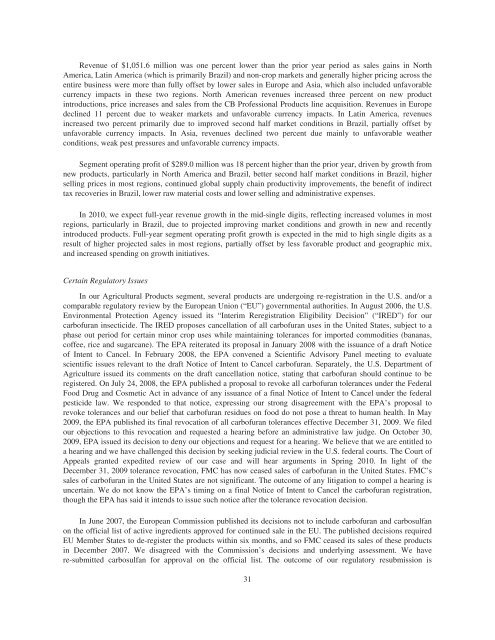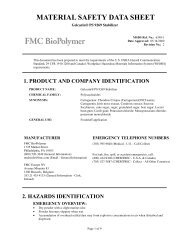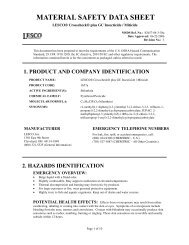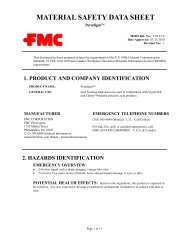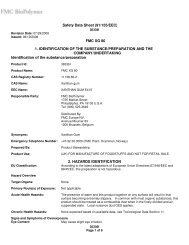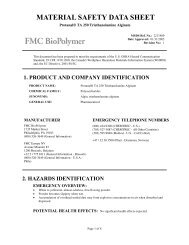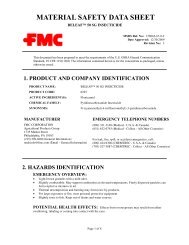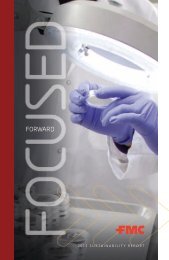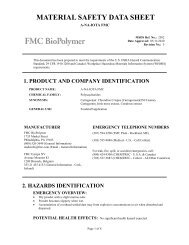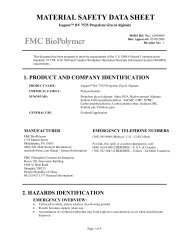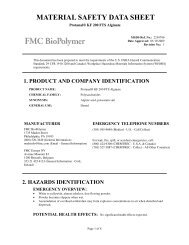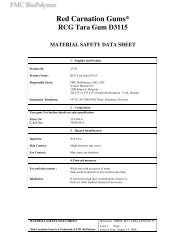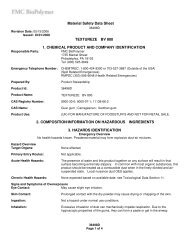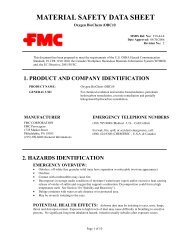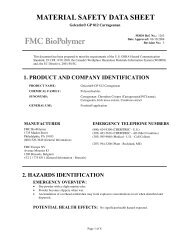Chairman's - FMC Corporation
Chairman's - FMC Corporation
Chairman's - FMC Corporation
Create successful ePaper yourself
Turn your PDF publications into a flip-book with our unique Google optimized e-Paper software.
Revenue of $1,051.6 million was one percent lower than the prior year period as sales gains in North<br />
America, Latin America (which is primarily Brazil) and non-crop markets and generally higher pricing across the<br />
entire business were more than fully offset by lower sales in Europe and Asia, which also included unfavorable<br />
currency impacts in these two regions. North American revenues increased three percent on new product<br />
introductions, price increases and sales from the CB Professional Products line acquisition. Revenues in Europe<br />
declined 11 percent due to weaker markets and unfavorable currency impacts. In Latin America, revenues<br />
increased two percent primarily due to improved second half market conditions in Brazil, partially offset by<br />
unfavorable currency impacts. In Asia, revenues declined two percent due mainly to unfavorable weather<br />
conditions, weak pest pressures and unfavorable currency impacts.<br />
Segment operating profit of $289.0 million was 18 percent higher than the prior year, driven by growth from<br />
new products, particularly in North America and Brazil, better second half market conditions in Brazil, higher<br />
selling prices in most regions, continued global supply chain productivity improvements, the benefit of indirect<br />
tax recoveries in Brazil, lower raw material costs and lower selling and administrative expenses.<br />
In 2010, we expect full-year revenue growth in the mid-single digits, reflecting increased volumes in most<br />
regions, particularly in Brazil, due to projected improving market conditions and growth in new and recently<br />
introduced products. Full-year segment operating profit growth is expected in the mid to high single digits as a<br />
result of higher projected sales in most regions, partially offset by less favorable product and geographic mix,<br />
and increased spending on growth initiatives.<br />
Certain Regulatory Issues<br />
In our Agricultural Products segment, several products are undergoing re-registration in the U.S. and/or a<br />
comparable regulatory review by the European Union (“EU”) governmental authorities. In August 2006, the U.S.<br />
Environmental Protection Agency issued its “Interim Reregistration Eligibility Decision” (“IRED”) for our<br />
carbofuran insecticide. The IRED proposes cancellation of all carbofuran uses in the United States, subject to a<br />
phase out period for certain minor crop uses while maintaining tolerances for imported commodities (bananas,<br />
coffee, rice and sugarcane). The EPA reiterated its proposal in January 2008 with the issuance of a draft Notice<br />
of Intent to Cancel. In February 2008, the EPA convened a Scientific Advisory Panel meeting to evaluate<br />
scientific issues relevant to the draft Notice of Intent to Cancel carbofuran. Separately, the U.S. Department of<br />
Agriculture issued its comments on the draft cancellation notice, stating that carbofuran should continue to be<br />
registered. On July 24, 2008, the EPA published a proposal to revoke all carbofuran tolerances under the Federal<br />
Food Drug and Cosmetic Act in advance of any issuance of a final Notice of Intent to Cancel under the federal<br />
pesticide law. We responded to that notice, expressing our strong disagreement with the EPA’s proposal to<br />
revoke tolerances and our belief that carbofuran residues on food do not pose a threat to human health. In May<br />
2009, the EPA published its final revocation of all carbofuran tolerances effective December 31, 2009. We filed<br />
our objections to this revocation and requested a hearing before an administrative law judge. On October 30,<br />
2009, EPA issued its decision to deny our objections and request for a hearing. We believe that we are entitled to<br />
a hearing and we have challenged this decision by seeking judicial review in the U.S. federal courts. The Court of<br />
Appeals granted expedited review of our case and will hear arguments in Spring 2010. In light of the<br />
December 31, 2009 tolerance revocation, <strong>FMC</strong> has now ceased sales of carbofuran in the United States. <strong>FMC</strong>’s<br />
sales of carbofuran in the United States are not significant. The outcome of any litigation to compel a hearing is<br />
uncertain. We do not know the EPA’s timing on a final Notice of Intent to Cancel the carbofuran registration,<br />
though the EPA has said it intends to issue such notice after the tolerance revocation decision.<br />
In June 2007, the European Commission published its decisions not to include carbofuran and carbosulfan<br />
on the official list of active ingredients approved for continued sale in the EU. The published decisions required<br />
EU Member States to de-register the products within six months, and so <strong>FMC</strong> ceased its sales of these products<br />
in December 2007. We disagreed with the Commission’s decisions and underlying assessment. We have<br />
re-submitted carbosulfan for approval on the official list. The outcome of our regulatory resubmission is<br />
31


